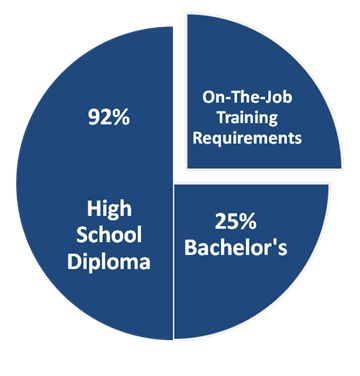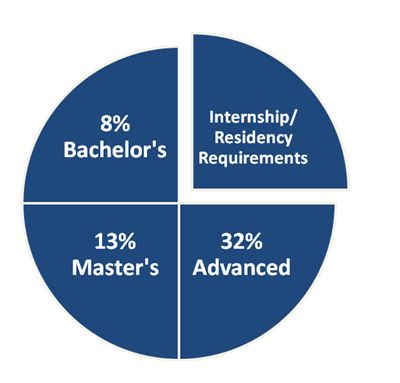Education, Entry-Level & Experience
Education plays a major role in determining an employee’s qualifications and the type of experience they are exposed to. For example, the most occupational fields are available at the high school diploma entry-level. However, 92 percent of these positions require long-term occupational training. The next field with the most entry-level positions available is at the bachelor’s level. Only a forth of these positions require on-the-job training.
High School Diploma
Majority of the occupations at the high school diploma entry level are in production, office administration and construction. Even these occupations are ideally filled with self-directed applicants who can think on their feet. There is an increasing lack of supervision over these positions and any problems with a clear cut solution have already been solved by a computer. Manufacturing supervisors want employees who can manage their own schedules and solve on-the-job problems quickly.
Occupations at the high school diploma entry level most often require some sort of occupational apprenticeship or long-term on the job training. Apprenticeships are commonly required of electricians, stonemasons and carpenters. These are a form occupational-specific work experience, which employees must perform once they have been hired.
Apprenticeships and on-the-job training are most common for occupations at the high school diploma level. These employees enter an occupation and then are trained on-site for the specific function or specialized position they were hired to perform.
Pre-Baccalaureate Awards
 Associate’s degrees and academic certificates are often used as an alternative route to occupations usually held by experienced high school diploma recipients. These academic awards give students an edge in the job market and also allow them to either skip or have reduced on-the-job training requirements.
Associate’s degrees and academic certificates are often used as an alternative route to occupations usually held by experienced high school diploma recipients. These academic awards give students an edge in the job market and also allow them to either skip or have reduced on-the-job training requirements.
Instead of being trained on-site for an industry specific position, these students attend educational programs designed for one. Unlike higher degree programs, associate and certificate awards are not expected to equip students with the basic skills needed to function effectively in a workplace without additional help and experience.
They do however, give students an edge. According to employers, only about 20 percent of associate degree holders were found to be lacking in necessary interpersonal skills. Compared to 70 percent at the high school entry level, associate’s degrees prove that higher education makes a difference in a student’s work performance and employers know it.
Bachelor’s Degree
Instead of on-the-job training, bachelor’s recipients are commonly required to undergo another type of work experience. Unlike apprenticeships, these employees are often first hired into internship positions, which help prepare them for higher positions within their occupation. They were hired with the expectation of already having the skills required of the position they were hired to full-fill. Internships are mainly used for the sake of experience and preparation.

Many bachelors’ occupations are managerial positions that need to be filled by experienced workers. For example, engineers generally need five years of work experience before rising to a managing position. Occupations requiring work experience usually do not offer on-the-job training and so on-the-job training is very scarce at the bachelor’s entry level.
There is a distinct shift at the bachelor’s degree entry level. Students are no longer hired and then trained to perform the very position they were hired for. A four-year educational degree or higher frees students from additional training once they have been hired. Almost all high-school diploma entry level positions require additional training, compared to almost none for bachelor’s recipients.
Advanced Degrees
As educational attainment increases, residencies replace internships. These are strictly for medical degree recipients and the most popular advanced degree field is in healthcare, working as a practitioner. Essentially physicians must complete two stages of medical training, finishing an advanced degree program and then a residency. This occupational training is not unlike a bachelor’s recipient working an internship position for experience.

Bachelors’ recipients may have the largest number of internships available to them, but percentages don’t lie. More entry-level positions for an advanced degree require internship or residency work experience than any other academic entry-level.
At the bachelors’ level, there is the largest number and variety of occupations available. Higher educational degrees see a decrease in the number of career paths. In fact, advanced degrees specialize in only a third of the occupation fields available to bachelor’s recipients. These educational programs are intended to prepare students for a specific area within an industry, making them more specialized than a broad bachelor’s education.
Industry Based Certifications & On-The-Job Training
Online certifications cannot stand alone. They are often preceded by a post-secondary education or included as a part of on-the-job training. Many companies and organizations use these programs to prepare employees for unique situations they wouldn’t normally be exposed to. Specializing employees in a specific occupational skill, these awards are often used to attain a higher position or pay.
